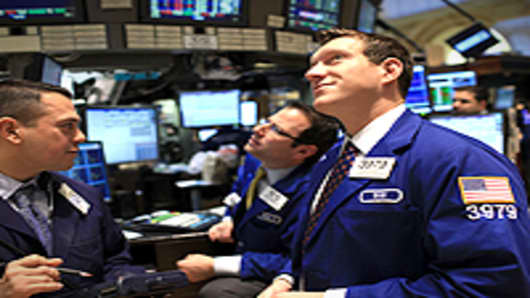Stocks could see a move higher similar to gains seen in 2003 and 2009, leading to a rise of as much as 40 percent in 2012, Michael Gayed, chief investment strategist at Pension Partners, told CNBC's "European Closing Bell".
Gayed conceded he is "probably among the most bullish of strategists." And his prediction is highly unlikely to come true if some of the more dire predictions about the U.S. economy come true. But he sticks to his assertion that a big jump higher could be on the way.
Gayed pointed out that indices like the Nasdaq , S&P 500 and DAX are still holding at high levels, despite major concerns over Spain's ability to fund its debts and believes that trend can persist.
"2011 was essentially entirely about a deflation scare caused by Greece. Here we are with Spain still being a problem, and yet the Nasdaq in the U.S. is over 3,000.The S&P is at 1,400. The DAX in Germany is at 6,700. You’ve seen tremendous resilience in the face of more negative news," he said.
"If the negative narrative is on its way out, if positive news is about to kick in, and equities are already elevated, then the retail public could easily push stocks to new highs," Gayed believes.
"I’ve been making the case that you could see a 2003 and 2009-like move in equities," he said, "whereby it’s possible that you get something in the order of 40 percent in the broader stock market," he said.
His reasoning for that relates to the reflation trade. Reflation refers to central banks and governments stimulating the economy by increasing the money supply or by reducing taxes - the opposite of deflation.
"What happens when you come off a deflation scare is you tend to have very big moves historically in risk assets,” Gayed said. “2011 was essentially entirely about a deflation scare caused by Greece.”
Gayed believes there will be a re-allocation out of bonds and into stocks, calling it “The Spring Switch.”
“There’s this paradox I think that’s happening here, whereby if you are bearish on equities at these levels, you are then automatically assuming that bond yields will drop further. Yet they are already – in Germany and the U.S. – at panic low levels,” he said.
Yields at such low levels make bonds incredibly unattractive, Gayed pointed out.
“It’s kind of this strange situation, if you’re betting on a correction, bond yields drop lower. But that makes stocks on a relative basis even more attractive,” he said.
Gayed is long U.S. equities. But he expects the next move higher in equities to be led by emerging markets as they employ easing methods to push their currency values down in order to counter softening demand from Europe.


